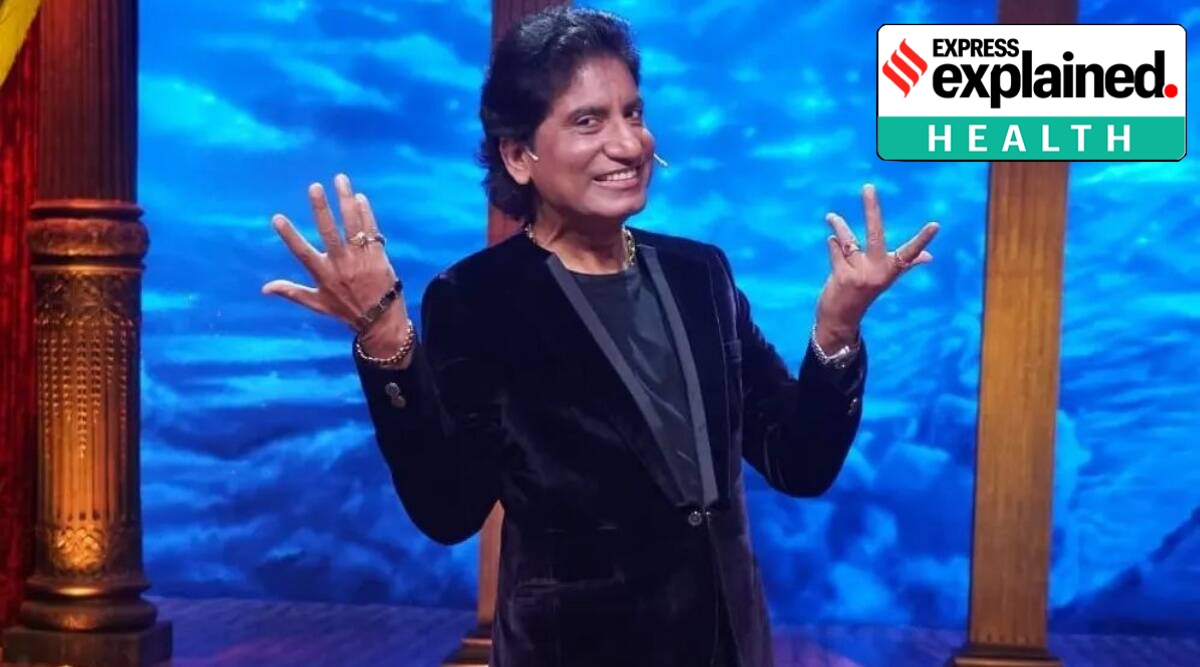Funny Raju Srivastava suffered a heart attack on August 10 while training in a gym. Over the years, there have been reports linking strenuous physical activity to sudden cardiac death. Does high-intensity exercise increase the risk of a heart attack?
What causes a heart attack?
Heart attacks occur when there is a sudden blockage in the coronary arteries that supply blood to the heart muscle.
“Chronic blockage of 70 percent or more in a coronary artery results in angina or chest pain with exertion, as the available blood supply does not meet the increased oxygen demand during exercise. However, a heart attack (acute myocardial infarction) can also occur when soft plaques that form in the coronary arteries rupture, causing a large clot to form. This can come without any prior warning symptoms. Even 30 per cent plaques can rupture and lead to the formation of a large obstructive clot,” said Professor K Srinath Reddy, Cardiologist, Epidemiologist and Chairman of the Public Health Foundation of India (PHFI).
A common misconception is that a blockage is the result of deposits of fat (lipids, cholesterol) and cells in the artery wall, similar to blockages in household plumbing. This is incorrect, according to Dr. Tushar Gore, managing director of Resonance Laboratories.
“The blockages are the result of cholesterol cells and particles breaking through the endothelial cell barrier and infiltrating the lining of the artery. As a result, there is a bulge on the wall of the artery, like a pimple. This is known as a plaque or stricture. Plaque doesn’t need to protrude into the artery, it could also protrude to the outside… Rupture and disruption of such blockages within the coronary artery initiate blood clotting mechanisms to ‘repair’ the injury caused because of plaque disruption,” he says.
According to Dr. Reddy, “Plaques form in the coronary arteries due to injury to the lining of the blood vessels by factors that cause inflammation.”
Fats circulating in the blood can deposit at the site of injury to grow plaque, says Dr. Reddy.
High blood pressure, smoking, diabetes, unhealthy diets, stress, inadequate sleep, or a recent infection are all factors that can cause such inflammation.
“Each of these chronic causes of inflammation can also acutely precipitate plaque rupture leading to heart attack, if there is a sudden or severe increase in one or more of these factors,” added Dr. Reddy.
What causes cardiac death during exercise?
Sudden cardiac death during strenuous physical activity most often occurs in cases where blockages go undiagnosed and sometimes in the setting of a known diagnosis.
Vigorous exercise can also cause plaque to rupture or trigger electrical disturbances in the heart that lead to cardiac arrest, Dr. Reddy said.
Dr. Suman Bhandari, Visiting Consultant, Interventional Cardiology, Fortis Escorts Heart Institute, says: “If a patient is revived in such a situation, he or she has a better chance compared to sudden cardiac arrest at rest where the heart is usually weak. ( heart failure).”
This does not mean that exercise is bad for the heart. “It is essential to detect and control the risk factors that generate and break plaques in the coronary arteries. Care and caution are even more necessary in Indians who have an ethnic susceptibility to experiencing heart attack at younger ages than other population groups,” says Dr. Reddy.
Can diagnostic tests help?
To identify risk, three things must be detected: presence of small plaque; probability of plate rupture (known as vulnerability); and the intensity of blood coagulation. Reliable non-invasive diagnostic tests are available only for the first one: small plaque detection. However, evidence (even if available) for each of these will not offer a guaranteed window into the future because all three factors change with lifestyle and environmental conditions.
!function(f,b,e,v,n,t,s)
{if(f.fbq)return;n=f.fbq=function(){n.callMethod?
n.callMethod.apply(n,arguments):n.queue.push(arguments)};
if(!f._fbq)f._fbq=n;n.push=n;n.loaded=!0;n.version=’2.0′;
n.queue=[];t=b.createElement(e);t.async=!0;
t.src=v;s=b.getElementsByTagName(e)[0];
s.parentNode.insertBefore(t,s)}(window, document,’script’,
‘https://connect.facebook.net/en_US/fbevents.js’);
fbq(‘init’, ‘444470064056909’);
fbq(‘track’, ‘PageView’);
.
